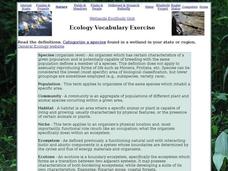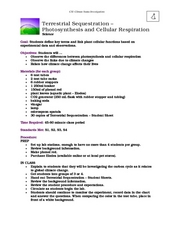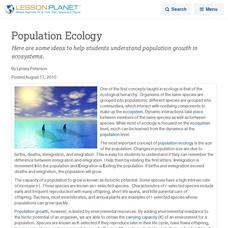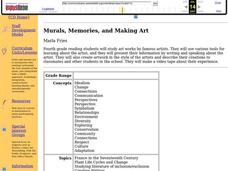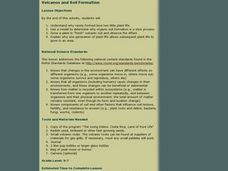Curated OER
Parts of the Seed
In this biology worksheet, students read about the parts of plant seeds and look at a seed diagram. They read about the roots, endosperm, embryo, and the process of germination. They answer 8 online multiple choice questions based on the...
Curated OER
Now You See It, Now You Don't
Students explore organic and inorganic objects. In this environmental lesson students perform a composting experiment using flowers in different soils. Students record their observations.
Curated OER
Composting
In this recognizing items that can be composted worksheet, students identify organic items that can be composted, write items that can be composted for each of the letters in the word compost, and make a list of vegetables and fruits....
Curated OER
Compost in a Bag!
Fourth graders experiment to see which objects decompose. In this compost lesson, 4th graders observe the changes of labeled objects in a bag. Leave the objects for one month and record the changes by observation and weight. Students...
Curated OER
Three Clouds Activity
Students understand how clouds are formed. In this cloud lesson, students participate in three experiments to make clouds. Students complete activity sheets for each experiment.
Curated OER
Web of Life Game: Trout
Students explore the concept of food webs. In this food web lesson, students demonstarte the connection between species. Students use a ball of string show how the food web works, then have a class discussion.
Curated OER
Planting Pumpkins
Students plant pumpkins. In this agriculture lesson, students use pumpkin seeds, mulch, and shovels to plant seeds from a pumpkin. Students observe the changes during each season.
Curated OER
Today is Monday - Calendar Math
Students practice memorizing the seven days of the week and keeping them in order. In this calendar lesson, students read aloud the book Today is Monday by Eric Carle, and create their own calendar style book using educational software....
Curated OER
Swimming With the Crabs!
In this environmental science activity, students complete a graphic organizer (Frayer model) on blue crabs. They write an article using the given facts.
Curated OER
Growing bacteria
Middle schoolers investigate the growth of bacteria under the right condition. In this biology lesson, students observe the growth of bacteria and fungi given the perfect condition to grow. They graph the result and investigate where...
Curated OER
Ecology Vocabulary Exercise: Wetlands
In this ecology vocabulary exercise: wetlands instructional activity, students read the definitions of 8 words, then categorize a species found in a wetland in their region. This page has numerous links to helpful web resources.
Curated OER
Food Chain: what's for dinner?
Fourth graders identify where foods came from and sequence a food chain. In this food chain lesson, 4th graders define vocabulary related to food chains and order a food chain. Students follow the energy of a food chain. Students...
Curated OER
How Groundhog's Garden Grew
Students answer questions based on Bloom's Taxonomy after reading the book, How Groundhog's Garden Grew, by Lynne Cherry. In this reading comprehension lesson, students respond to 6 questions, one per taxonomy level, to demonstrate...
Curated OER
Managing Ecosystems
Students take a closer look at managing ecosystems in Britain. In this geography skills lesson, students determine how applying climax vegetation theories to the Salisbury Plain have helped or hindered the area.
Curated OER
Photosynthesis and Cell Respiration
Fifth graders participate in scientific inquires regarding the concepts of photosynthesis and cell respiration. In this photosynthesis and cell respiration lesson, 5th graders describe the process of photosynthesis with relation to...
Curated OER
Terrestrial Sequestration- Photosynthesis and Cellular Respiration
Students examine the differences between cellular respiration and photosynthesis. For this cellular processes lesson students complete a group lab activity to see how climate change affects their lives.
Curated OER
Population Ecology
Here are some ideas to help students understand population growth in ecosystems.
Curated OER
Tulips: Predicting the Arrival of Spring
Learners use the blooming of tulips as a tool to measure spring's journey north. They predict when tulips bloom at 13 selected Journey North gardens in various geographic regions.
Curated OER
An Antidote to Plagiarism
Young scholars discover how to write a research paper without directly copying written material. They read a passage, then record on the board any words that are new for them. They define these words, then organize their facts to create...
Curated OER
Murals, Memories, and Making Art
Fourth grade reading students study art works by famous artists. They use various tools for learning about the artist, and they present their information by writing and speaking about the artist. They also create artwork in the style of...
Curated OER
Holy Habitats or Meet Metamorphosis
Students examine the metamorphosis of frogs and how it adapts to its environment. They research how world pollutants are effecting the amphibian population.
Curated OER
Beaver Ecology
Learners explore the lives of bgeahvers. They identify the physical and behavioral adaptations that help beavers survive in their environment. Students compare and contrast how beavers influence the ecology of both forest and aquatic...
Curated OER
Why So Many Frogs?
Students explain the different stages in the growth of a frog, then analyze and collect data to make generalizations about a larger population. They determine the survival rate of a population of tadpoles under controlled conditions.
Curated OER
Frog Metamorphosis
Students play 20 Questions with animal characteristics and then view an animation of how a tadpole changes into a frog. They consider the importance of camouflage to frogs and write out the story of a frog from tadpole to adult.
Other popular searches
- Life Cycle of a Plant
- Plant Animal Life Cycles
- Plant Lifecycle
- Life Cycle of Plant
- "Life Cycle" Plant
- Plant, Animal Life Cycles
- Life Cycle Plant
- Life Cycle Bean Plant
- Life Cycle Flowering Plant
- Life Cycle of a Bean Plant
- Science Life Cycle of a Plant
- Life Cycles of a Plant












